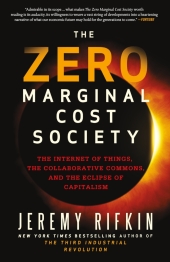 Neuerscheinungen 2015Stand: 2020-02-01 |
Schnellsuche
ISBN/Stichwort/Autor
|
Herderstraße 10
10625 Berlin
Tel.: 030 315 714 16
Fax 030 315 714 14
info@buchspektrum.de |

Jeremy Rifkin
The Zero Marginal Cost Society
The Internet of Things, the Collaborative Commons, and the Eclipse of Capitalism
2015. 368 p. 23,5 cm
Verlag/Jahr: MACMILLAN US 2015
ISBN: 1-13-728011-5 (1137280115)
Neue ISBN: 978-1-13-728011-4 (9781137280114)
Preis und Lieferzeit: Bitte klicken
Teilen ist das neue Besitzen:
Der Kapitalismus geht zu Ende? Eine gewagte These! Doch wer könnte eine solch spannende Zukunftsvision mit Leben füllen? Jeremy Rifkin - Regierungsberater, Zukunftsvisionär und Bestsellerautor. Kurz: "einer der 150 einflussreichsten Intellektuellen der Welt" (National Journal). Rifkin ist überzeugt: Das Ende des Kapitalismus kommt nicht von heute auf morgen, aber dennoch unaufhaltsam. Die Zeichen dafür sind längst unübersehbar:
- Die Produktionskosten sinken.
- Wir leben in einer Share Economy, in der immer mehr das Teilen, Tauschen und Teilnehmen im Fokus steht.
- Das Zeitalter der intelligenten Gegenstände - das Internet der Dinge - ist gekommen.
Es fördert die Produktivität in einem Maße, dass die Grenzkosten vieler Güter und Dienstleistungen nahezu null sind, was sie praktisch kostenlos macht.
- Eine einst auf Knappheit gegründete Ökonomie macht immer mehr einer Ökonomie des Überflusses Platz.
Ein neues Buch für eine neue Zeit.
Jeremy Rifkin fügt in seinem neuen Buch "Die Null-Grenzkosten-Gesellschaft. Das Internet der Dinge, kollaboratives Gemeingut und der Rückzug des Kapitalismus" die Koordinaten der neuen Zeit endlich zu einem erkennbaren Bild zusammen. Aus unserer industriell geprägten erwächst eine globale, gemeinschaftlich orientierte Gesellschaft. In ihr ist Teilen mehr wert als Besitzen, sind Bürger über nationale Grenzen hinweg politisch aktiv und steht das Streben nach Lebensqualität über dem nach Reichtum.
Die Befreiung vom Diktat des Eigentums hat begonnen und mit ihr eine neue Zeit.
- Wie wird dieser fundamentale Wandel unser Leben verändern?
- Wie wird der Wandel unsere Zukunft bestimmen?
- Was heißt das schon heute für unseren Alltag?
Kein anderer könnte die Zeichen der Zeit besser für uns deuten als der Zukunftsvisionär Rifkin in seinem neuen Buch.
New York Times bestselling author Jeremy Rifkin explores how today´s unprecedented interconnectedness is making core institutions such as private property, democracy, and national boundaries irrelevant - and explains what will replace them. We are, Rifkin says, entering a world beyond markets where we are learning how to live together collaboratively and sustainably.
In The Zero Marginal Cost Society, New York Times bestselling author Jeremy Rifkin describes how the emerging Internet of Things is speeding us to an era of nearly free goods and services, precipitating the meteoric rise of a global Collaborative Commons and the eclipse of capitalism.
Rifkin uncovers a paradox at the heart of capitalism that has propelled it to greatness but is now taking it to its death - the inherent entrepreneurial dynamism of competitive markets that drives productivity up and marginal costs down, enabling businesses to reduce the price of their goods and services in order to win over consumers and market share. (Marginal cost is the cost of producing additional units of a good or service, if fixed costs are not counted.) While economists have always welcomed a reduction in marginal cost, they never anticipated the possibility of a technological revolution that might bring marginal costs to near zero, making goods and services priceless, nearly free, and abundant, and no longer subject to market forces.
Now, a formidable new technology infrastructure--the Internet of things (IoT) - is emerging with the potential of pushing large segments of economic life to near zero marginal cost in the years ahead. Rifkin describes how the Communication Internet is converging with a nascent Energy Internet and Logistics Internet to create a new technology platform that connects everything and everyone. Billions of sensors are being attached to natural resources, production ...


